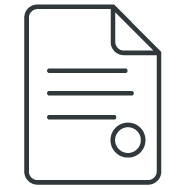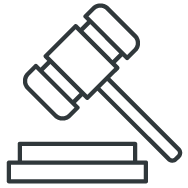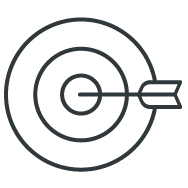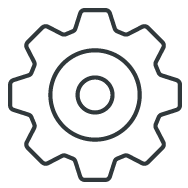Quality in the aerospace industry
First Certification bodies to have qualified Aerospace auditors in India.
Over 100 organizations are already certified for AS9100 series standards.
The flexibility of having AS9100 certification under ANAB & Dakks.
Team of qualified Aerospace Experienced Auditors (AEA) and Aerospace auditors (AA), having vast experience in the Aerospace, Defense and manufacturing industry.

What is quality management according to AS 9100 / 9110 / 9120?
The set of standards for quality management in the aerospace industry is divided into the following three parts:
AS 9100: 2016 Rev D / EN 9100:2018 - for all Organizations that design, develop, manufacture and/or provide aviation, space and defence products and services, and for organizations that provide post-delivery activities, including the provision of maintenance, spare parts or materials for their own products and services.
AS 9110: 2016 Rev C / EN 9110:2018 - for organizations whose primary business consists of providing maintenance or continuing airworthiness services for civil and military aerospace articles and products, and for original equipment manufacturers [OEM] that perform maintenance, repair, and overhaul activities under their own responsibility or substantially different from their production activities.
AS 9120: 2016 Rev B / EN 9120:2018 - for distributors and stockists who purchase parts, materials and assemblies and resell these products to customers in the aerospace and defense industry. EN 9120 also covers organizations that purchase products and divide them into smaller quantities, as well as those that coordinate a customer- or government-directed process on the product.
The requirements specified in the standards are in addition to, and not an alternative to, contractual and applicable legal and regulatory requirements. If processing activities are performed on aerospace components, you need certification according to EN 9100 or EN 9110.
The globally recognized standards of the 9100 series bear the designation of the regionally responsible IAQG sectors before the name of the standard: EN for Europe, AS for America (i.e. AS 9100), JISQ/SJAC for Japan/Asia/Pacific (i.e. JISQ 9100 or SJAC 9100). In terms of content, the standards are identical and recognized as equivalent worldwide.
Please note: These are not ISO standards. The ISO 9100 series of standards deals with closures for glass containers.

Who can be eligible for AS / EN 9100 series certifications?
Currently, if you have the infrastructure to cater to other non-aerospace industries, with a “delta-upgrade” with respect to system integration, your organization can come up to be AS9100 series certified.
For being an AS9100-certified organization, you don’t need to have AS orders or even an intent to be AS supply chain partner. With your current customer base and processes, you can get AS9100 certified.

What are the benefits of AS/EN9100 series certification?
The advantages of AS/ EN 9100 certification at a glance:
- The visible sign of compliance with the requirements of Aerospace OEM (Original Equipment Manufacturers), Tier 1 & Tier 2 supply chain partners.
- Listing your company as a competent supplier in the Online Aerospace Supplier Information System (OASIS) database of the IAQG. Only this entry provides proof of an internationally recognized, accredited certificate.
- Economic benefits through clear structuring of product and process information by means of a quality management system
- Binding processes and responsibilities that support the continuous improvement of processes and their results
- Risk-based thinking and complete verification become part of your corporate culture
- Integration of requirements from normative and legally regulated areas
- Strong confidence of your customers, business partners and stakeholders in your quality management system
- Transparency through clearly traceable structuring, release and modification of requirements/specifications and products, for example through configuration management
DQS India certificates are internationally recognized because they include all relevant sector markings.

Who is allowed to perform certification according to EN 9100?
In order to certify an Aerospace management system, the respective certification body itself must be accredited according to AS / EN 9104 and listed in the OASIS database by IAQG. Due to the extensive revision of the EN 9104 standard, certified organizations in the industry will see some fundamental changes in 2023. This mainly applies to the certification structures, the calculation of audit times and the reporting via the new OASIS database, version 3.
DQS India is accredited by DAkkS and ANAB, and therefore authorized to perform audits and certifications according to AS9100 & EN9100 series.

How does an AS 9100 certification proceed?
In order to get certified, the first step of the process is to provide information about your company, your current quality management and the goals of an AS/ EN 9100 certification with us.
Based on these discussions, you will receive an individual offer tailored to the needs and requirements of your company.
These steps prepare the organizations for actual audits for certification. Project planning can be useful for larger projects to coordinate schedules and implementation of audits for sites or areas. In addition, a pre-audit provides an opportunity to identify your system's strengths and potential for improvement in advance.
The certification audit starts with an analysis and evaluation of your system and determines whether your management system is suitable for certification. In the next step, your on-site DQS India auditor evaluates the effectiveness of the management processes using the appropriate standard. The results are presented at a final meeting. If necessary, action plans are agreed upon.
After the audit, the results are evaluated by the independent technical review board of DQS India and if all requirements are met, AS / EN 9100 certification is issued. The certificate gets published in the OASIS database & the organization’s name appears under the “Certified supplier directory” of the OASIS
Essential components of your system are audited again annually on-site. In this way, the continuous improvement of your management system and business processes is competently monitored.
The certificate according to AS/ EN 9100 is valid for a maximum of three years. In good time before the certificate expires, recertification is carried out to ensure continued compliance with the applicable standard requirements. Upon compliance, a new certificate is issued with 3 years of validity.

What does AS/EN 9100 certification cost?
For these reasons, the costs for certification in aerospace and aviation according to EN 9100 cannot be given as a lump sum. We will be happy to make you an individual offer for your company or organization.
In order for us to give you an overview of the costs for EN 9100 certification, we need precise information about your organization and the scope of your AQMS in advance. This will enable us to send you a tailor-made offer. Contact us directly here, your personal contact person will advise you.
Cost basis of an EN 9100 certification according to the revision of EN 9104-001
With the revision of the EN 9104-001 standard, some changes have occurred with regard to the costs of certification according to EN 9100 ff. The following 4 points are relevant to this:
1. How complex is your management system?
Here the number and structure of the sites are considered as well as the complexity of the organization and its management system. As far as the structure is concerned, there will only be two structures within the scope of AS/EN 9104 in the future: "Single-site" or "Multi-site". Organizations that belonged to the previous "Complex", "Campus" or "Several" structures will now be assigned to the new "Multi-site" structure.
2. What are the core processes of your company within the scope of the AQMS?
In determining the necessary audit effort, the question of whether your organization engages in product development plays a particularly important role.
3. What are the risks in your organization?
A risk analysis shall be conducted prior to initial certification and updated as necessary prior to each surveillance or recertification audit.
The risk analysis includes information on the organization's performance for each location within the scope of certification, including:
- On-time delivery of the organization's product or service to the customer.
- Conformance of the product or service delivered to the customer's requirements
- PEARs and associated Key Performance Indicators (KPIs).
- Customer complaints and process effectiveness level(s), if applicable
- Level of regulatory requirements
- Maturity and effectiveness of management system, including results of management review and internal audits
- Risks associated with products, processes, or activities, for example, design, safety, reliability, or complexity
4. How to calculate the audit time?
The audit time is calculated in four steps, with the participation of the organization (to be) certified:
Step 1: Determination of the basic audit duration based on Table 8 from EN 9104-001 (type of audit + number of employees).
Step 2: Possible consideration of risk increase or reduction (based on OCAP risk analysis, +/- 10 percent).
Step 3: Application of reductions according to Table 10 from EN 9104-001
Step 4: Consideration of additional audit time, e.g. use of translators, timeliness of prior reviews of corrective actions and contractual requirements.

Why DQS India?
- Personal, smooth support from our specialists - regionally, nationally and internationally
- Individual quotes with flexible contract terms and no hidden costs
- High level of Transparency may be it cost assessments or commitments.
DQS India has got a good pool of AS9100 assessment resources from the aviation, space & defense sectors and industry background of varied products & services.
AS9100 audit planning, OASIS data management, and many of the post-audit activities are governed by the DQS India office, which makes the AS9100 certification process more controlled and responsive.

